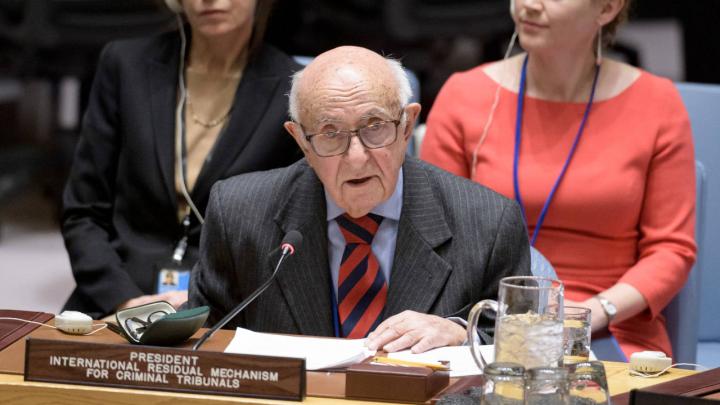President Meron briefs UN Security Council on progress of work

The President of the International Residual Mechanism for Criminal Tribunals (Mechanism), Judge Theodor Meron, today presented his final report to the United Nations Security Council (Council) as President of the Mechanism, highlighting the most notable developments in the Mechanism’s work.
In his remarks, President Meron noted the budgetary and operational challenges that the Mechanism has faced over the previous six months, emphasizing that despite such challenges significant advances have been made in the completion of the Mechanism’s mandate. Underlining the Mechanism’s continued efforts to ensure that key residual functions are carried out with steadfast professionalism, President Meron paid special tribute to Registrar Mr. Olufemi Elias for his “leadership, his abiding integrity, and his excellent stewardship”.
Turning to important milestones, President Meron emphasized the recent adoption of the Rules of Detention governing matters both in Arusha and The Hague as well as the adoption of amendments to the Rules of Procedure and Evidence as a reflection of the Mechanism’s “unceasing attention to finding ways to improve its methods and work and serve as a model for courts in other jurisdictions.”
The President further informed the Council of the smooth and successful completion of the first judicial hearing in September at the new, custom-built courtroom in Arusha in the contempt case of Turinabo et al., and thanked the Government of Rwanda for their invaluable cooperation in carrying out the arrest and transfer of the accused in that case.
President Meron also briefed the Council on important steps taken to ensure a smooth transition to the new Mechanism President, Judge Carmel Agius, in January. In reflecting upon his nearly seven-year tenure as President of the Mechanism, President Meron highlighted some of the most notable achievements, whilst giving special thanks to both the Chef de Cabinet and Principal Legal Advisor at the Mechanism, Ms. Gabrielle McIntyre, and to all the staff for their dedication toward making the Mechanism “a model of what an international criminal judicial institution can and should be.”
President Meron further reflected on some of his regrets, including his profound regret that a different and better resolution for the situation of Judge Aydin Sefa Akay was not found. The President noted in this regard that “[a]t a time when the world is facing deeply troubling trends related to the undermining of independent judiciaries and the weakening of the rule of law, we at the United Nations simply cannot afford to be anything less than exemplary when it comes to our own handling of interference with judicial independence and actions undertaken in contravention of UN immunities”.
Notwithstanding his regrets, President Meron stated that he is exceptionally proud of what has been achieved by the Mechanism over the last seven years, noting that it was during his tenure that the Rules of Procedure and Evidence were adopted, the Judges sworn in, and the two branches first opened. The Judges adopted a ground-breaking code of professional conduct and proceeded to revise this code to provide a disciplinary process, which is “a reflection on the importance of accountability in all aspects of [the Judges’] work”. During the President’s tenure, responsibility for judicial activities as well as non-judicial residual functions was transferred from the ICTR and the ICTY and carried out smoothly “and to the highest standards”, and the Mechanism has taken the steps needed to stand on its own. President Meron reflected that indeed, the Mechanism has “shown that the new model by which Judges work remotely can function efficiently and economically, in full compliance with due process requirements”.
The President further recalled that the Mechanism constructed a new, minimalist facility in Arusha, thanks to the exceptional generosity of the Government of Tanzania, and that it has started important traditions in these new premises, hosting a judicial colloquium for national, regional, and international Judges and visits by a wide range of officials seeking to learn from the Mechanism’s practices, as well as maintaining and making accessible one of the leading law libraries in the region.
President Meron recalled the important achievements at The Hague branch as well, including the establishment of the new Information Centre on the ICTY in Sarajevo and the positive indications given by the Republic of Croatia and the Republic of Serbia with regard to the establishment of information centres in those countries.
The President noted that all the while, he and his Colleagues have “made it a priority to build an exemplary UN institution”. President Meron recalled that the Mechanism’s remarkable body of staff, drawn from over 70 countries, has repeatedly surpassed the Secretary-General’s gender parity goals. The President praised the Mechanism’s staff and stated that through “their professionalism and ingenuity, their resourcefulness and resilience, these staff have been invaluable when it comes to making the Mechanism what it is today”.
In closing, the President recalled that it was through the horrors of the Holocaust and the subsequent global need to “reaffirm faith in fundamental human rights, in human dignity, and in the value of justice and the rule of law” that the United Nations were established. He noted that the ad hoc tribunals, and the Mechanism as their successor, continue to serve as symbols of those fundamental values.